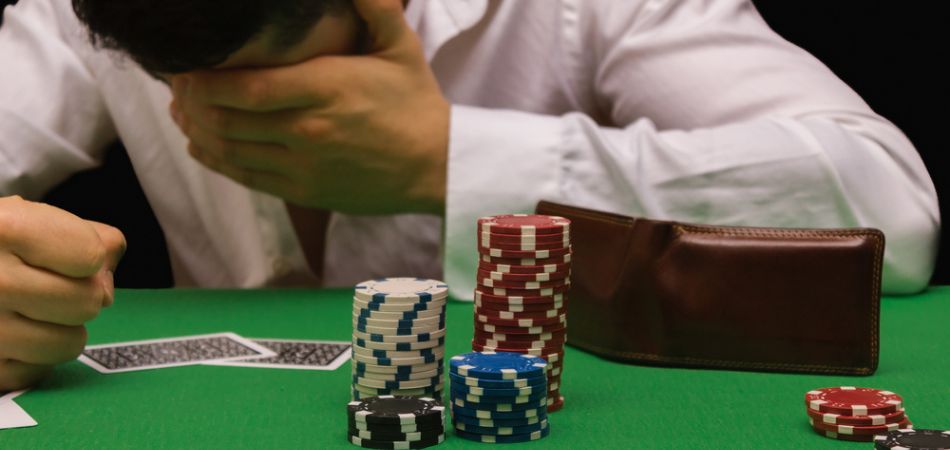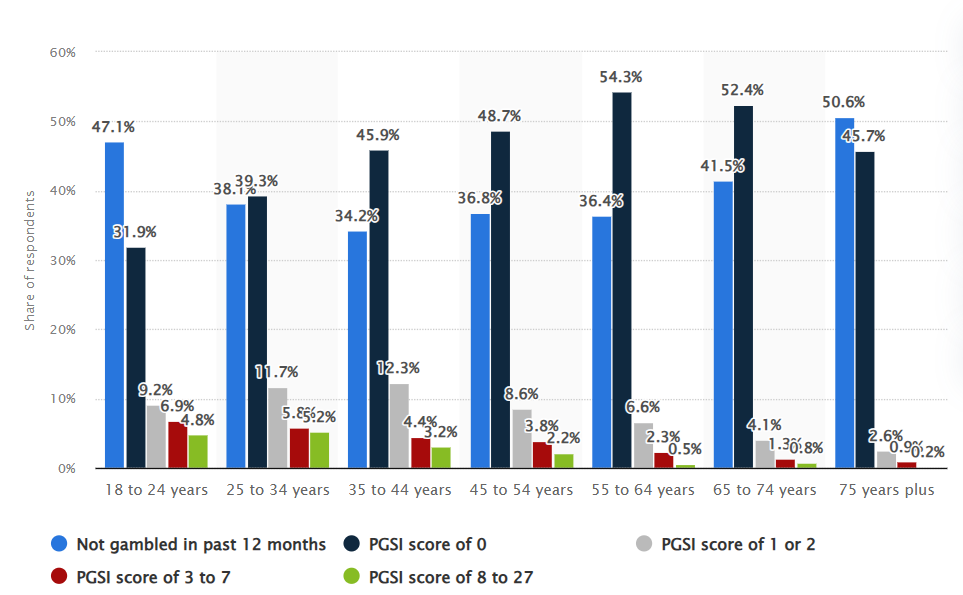Gambling Addiction: The Causes, Signs and Side Effects
When most people think of gambling, two very different images come to mind. One is pure Casino Royale; millionaires in tuxedos, casually tossing high-stakes chips across the table. The other is far more familiar in the UK: people hunched over fruit machines in high street bookmakers or quietly betting at the dog track. So, which one has the gambling addiction? Well, the answer could be one, the other, both or even neither.
What is classed as gambling?
There are so many forms of gambling out there. Some are instantly recognisable, like casino table games such as blackjack or roulette. Others don’t always get thought of as gambling at all. The lottery, for example, is seen by many as a harmless flutter, but it still counts. In reality, gambling comes in many shapes and sizes, and not all of them take place in a casino.
Here are just a few examples:
- Casino table games like blackjack, roulette and poker
- Slot machines and fruit machines
- Sports betting (online or in person)
- Horse and greyhound racing
- Lottery and scratch cards
- Bingo (in halls or online)
- Online gambling sites and apps
- Spread betting or financial market speculation
There are so many different ways to gamble, especially in the UK, where it’s been legal since 1962. But with that freedom comes the risk of frequent gambling and, for some, the very real possibility of developing a gambling addiction.

What is a gambling addiction?
As we touched on earlier, gambling addiction is a tricky one to spot. Like any behavioural addiction, it’s also hard to pinpoint the exact moment it shifts from casual, occasional fun to something more serious. One of the best ways to understand where that line is drawn is to look at the official criteria used for diagnosis, the DSM-5.
According to the DSM-5, gambling disorder is when someone meets certain criteria within a 12-month period. Here’s what that looks like:
- The need to gamble with more and more money to get the same buzz.
- Feeling restless or irritable when trying to cut down or stop.
- Repeated, unsuccessful attempts to control, cut back or stop.
- Thinking about gambling constantly, whether it’s past wins/losses or the next bet.
- Using gambling as an escape from feeling low, anxious or stressed.
- Chasing losses, i.e, trying to win back money that’s already gone.
- Lying to hide gambling habits from family or friends.
- Risking important relationships, jobs or opportunities because of gambling.
- Relying on others to bail you out financially after losses.
If four or more of these gambling addiction symptoms feel familiar, it could mean an addiction is already forming or has taken hold. If you recognised yourself here, you’re far from alone. As we’ll see next, problem gambling in the UK is affecting millions right now.
Reach out to our expert support team 24 hours a day

Start the Gambling Rehabilitation Process Today
Finding the best gambling treatment is vital for long-term recovery success. Our friendly and compassionate team will hold your hand through the process until you learn to love yourself again.
Problem gambling in the UK
The latest data from February 2024 paints a sobering picture of gambling in the UK. While most people either haven’t gambled in the past year or do so without signs of harm, the numbers show a clear and worrying trend: problem gambling is hitting younger adults the hardest.

In the 18 to 24 age group, nearly one in ten (9.2%) are at moderate risk of harm and almost one in twenty (4.8%) are already in the grip of a serious gambling problem. That’s the highest rate of severe gambling harm in any age group, meaning thousands of young people could already be on a dangerous path.
For those aged 25 to 34, the picture improves slightly but not by much, with 5.5% at moderate risk and 2.6% meeting the criteria for severe problem gambling. From the mid-30s onwards, the rates steadily drop, with those aged 65 and over showing less than 1% in the most severe category.
One striking detail is that gambling participation doesn’t simply decline with age. While over half (50.6%) of those aged 75+ haven’t gambled in the past year, the majority of older adults who do gamble tend to do so without harm.
The message is hard to ignore: gambling harm is not evenly spread. It’s concentrated among younger adults, many of whom are navigating an online world where betting is more accessible and more relentless, than ever before.
The devastating impact of a gambling addiction
In the previous section, we looked at numbers. Boring stats, boring figures on a page. But what those numbers don’t show is the human cost, especially the devastating effect a gambling addiction can have on a person’s life and the people around them. These impacts can take hold quickly, sometimes before the person even realises, and they can deepen over the years until they feel impossible to escape.
Below, we take a look at the short-term and long-term effects a gambling addiction can have on every aspect of a person’s life.
Short-term effects of gambling addiction
- Rapid and unexpected financial losses that can wipe out savings in days.
- Mounting debt from credit cards, loans or borrowing from friends and family.
- Strained relationships as trust begins to erode over lies and secrecy.
- Neglect of responsibilities at work or home, leading to warnings or job loss.
- Emotional swings between euphoria after wins and crushing despair after losses.
- A growing need to gamble more often and with higher stakes to feel the same rush.
Long-term effects of gambling addiction
- Complete financial collapse, including bankruptcy and asset repossession.
- Breakdown of marriages or long-term relationships, often leaving lasting scars.
- Severe mental health problems such as depression, anxiety or suicidal thoughts.
- Social isolation as friendships fade and support networks disappear.
- Legal trouble, including fraud or theft, in desperation to fund gambling.
- Long-term damage to career prospects and personal reputation that can take decades to repair.
If any of this feels uncomfortably familiar, now is the time to act. The sooner you take that first step towards rehab treatment, the sooner you can start regaining control over your life.
Is there help for gambling addiction?
Yes, and no matter how overwhelming things feel right now, there’s a way forward. At The Providence Project, we understand that gambling dependence isn’t just about the bets you place. It’s about the stress, the secrecy, the sleepless nights and the feeling that you can’t switch your mind off.
That’s why we offer a dedicated gambling addiction recovery programme, built not only to give you the tools and guidance you need to take your life back, but also give you long-term, extensive support far beyond the time you spend at our rehab centre, through our carefully crafted treatment pathway.
Whether you’re at rock bottom or just starting to see the warning signs, we’ll meet you where you are and help you move forward, step by step, so contact us today.
Reach out to our expert support team 24 hours a day

Start the Gambling Rehabilitation Process Today
Finding the best gambling addiction treatment is vital for long-term recovery success. Our friendly and compassionate team will hold your hand through the process until you learn to love yourself again.
Frequently Asked Questions
How quickly can a gambling addiction develop?
For some, gambling addiction can develop in just a few months of gambling abuse, especially with frequent play or high-stakes betting. For others, it builds slowly over the years. The speed depends on personal vulnerability and gambling habits.
Who is most at risk of developing a gambling addiction?
People with impulsive personalities, existing mental health issues, high stress levels or easy access to gambling are most at risk. Younger adults also face a higher risk due to online gambling exposure and social influences.
Is a gambling addiction hereditary?
Genetics can play a role but environment matters too. If gambling problems run in your family, your risk may be higher. Learned behaviours, peer influence and personal coping styles are also important factors.
(Click here to see works cited)
- American Psychiatric Association, DSM-5 Task Force. (2013). Diagnostic and statistical manual of mental disorders: DSM-5™ (5th ed.). American Psychiatric Publishing, Inc.. https://doi.org/10.1176/appi.books.9780890425596
- Problem Gambling Rates by Age Great Britain 2024 | Statista, www.statista.com/statistics/543465/problem-gamblers-united-kingdom-uk/ Accessed 11 Aug. 2025.